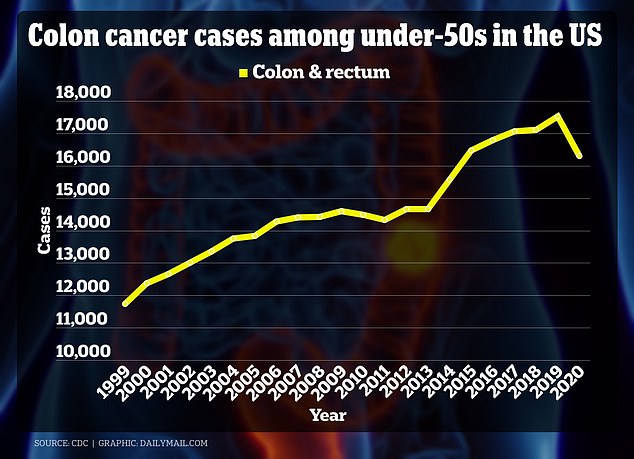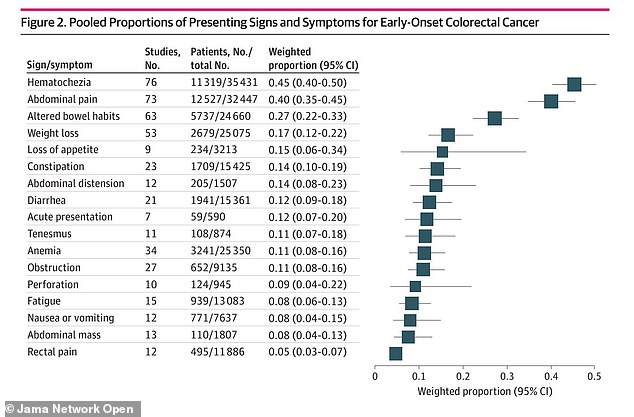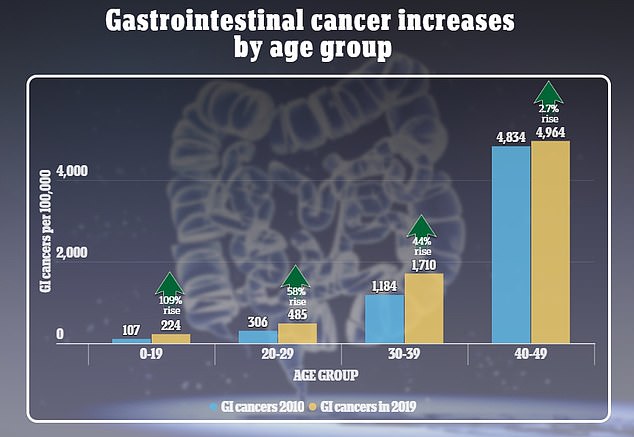A major study has revealed the 17 most common symptoms of the fastest growing cancer in young people.
Colorectal cancers in people younger than 50 years were most often preceded by rectal bleeding, abdominal pain, and changes in bowel movements.
Additionally, many patients experience anemia, weight loss, and fatigue.
Researchers from six countries, including the United States, reached the finding after analyzing data from more than 80 studies, which included almost 25 million colorectal cancer patients under the age of 50.
Young patients are urged to have a colonoscopy if they experience any of these symptoms, as they are not routinely screened for the disease.
Rectal bleeding, abdominal pain and changes in bowel movements are the key signs of colorectal cancer in young people, according to a study published in JAMA Network Open

The graph above shows colon cancer cases among people under 50 years of age by year. There is a drop in 2020 because the Covid pandemic caused fewer people to show up for screening.
The findings come as colorectal cancer rates are expected to double from 2010 to the end of the decade, an alarming increase that doctors are still trying to determine.
“Early-onset colorectal cancer (EOCRC), defined as a diagnosis before age 50, is on the rise, and so-called warning signs and symptoms among these individuals often go unrecognized, leading to delays in diagnosis,” they wrote. the researchers.
“Better recognition of the signs and symptoms associated with EOCRC could facilitate more timely diagnosis and impact clinical outcomes.”
The research team used the data to determine which symptoms were most common, what signs put patients at higher risk for colon cancer, and how long it took patients to get a colon cancer diagnosis.
They found that rectal bleeding was linked to a five-fold increase in the risk of early-onset colon cancer, making it the largest risk factor.
In addition, one in 10 patients developed symptoms quickly and severely.
Initially, the researchers reviewed 12,859 research articles and narrowed the list to 81 studies conducted between 2000 and 2023.
They found that 45 percent of patients experienced rectal bleeding or blood in stool, and 40 percent suffered abdominal pain.
Additionally, 27 percent had changes in their bowel habits, which could include having more or fewer bowel movements.
Weight loss was seen in 17 percent of patients, while 15 percent lost their appetite.
And although 12 percent had an acute presentation, meaning their symptoms appeared quickly, it took them an average of four to six months to get a diagnosis.
“Younger patients may experience ongoing signs and symptoms and delay seeking medical care,” the researchers wrote.
“Possible reasons for these delays include the patient believing they are too young to worry about cancer or lack of access to primary care or health insurance.”

Researchers analyzed 81 studies to determine the most common signs of colorectal cancer in young people. They found that rectal bleeding or blood in the stool was the most common sign

Rates of gastrointestinal cancers increased most markedly in the youngest age group, followed by the 20- to 29-year-old cohort. There were also more cases of gastrointestinal cancer among older people, although in that case it is still considered early-onset cancer.
And even if a patient seeks medical help, “both patients and doctors may downplay the severity of symptoms and fail to recognize key red flags and clinical signs that should trigger suspicion of colorectal cancer,” the team said. .
They noted that too often, rectal bleeding, the most common sign, is attributed to harmless conditions such as hemorrhoids.
A 2020 survey of Colorectal Cancer AllianceFor example, it found that 68 percent of patients experienced blood in their stools and many of them were misdiagnosed or ruled out.
More than half of the participants said they had been misdiagnosed with conditions such as hemorrhoids, irritable bowel syndrome, anemia and mental health problems.
The team found that patients between 19 and 39 years old were the most likely to feel dismissed.
Alarmingly, these are the age groups in which colon cancer is increasing most rapidly. Recent statistics suggest that colon cancers have increased by 500 percent in children ages 10 to 14 and 333 percent in adolescents ages 15 to 19.
The American Cancer Society estimates that this year there will be 106,590 cases of colon cancer and 46,220 cases of rectal cancer, along with 53,010 deaths.
It is currently the fourth most common cancer in the US behind lung, prostate and breast cancer. And almost one in four patients is diagnosed after the disease has already spread to other organs.
Overall, “delays in diagnosis after the presentation of signs or symptoms are up to 40% longer compared to older people with colorectal cancer,” the researchers wrote.
They advised doctors to work with patients to ensure they were diagnosed quickly. They also suggested that patients should request a colonoscopy or stool test if they experience symptoms.
The review was published last week in the journal. Open JAMA Network.
| Symptom | Percentage of patients |
|---|---|
| Hematochezia (rectal bleeding/blood in stool) | Four. Five |
| Abdominal pain | 40 |
| Altered bowel habits | 27 |
| Weightloss | 17 |
| Loss of appetite | fifteen |
| Constipation | 14 |
| Abdominal distension/swelling | 14 |
| Diarrhea | 12 |
| Acute presentation (severe or sudden onset) | 12 |
| Tenesmus (sudden need to defecate) | eleven |
| Anemia | eleven |
| Obstruction | eleven |
| Drilling | 9 |
| Fatigue | 8 |
| Nausea or vomiting | 8 |
| abdominal mass | 8 |
| rectal pain | 5 |

